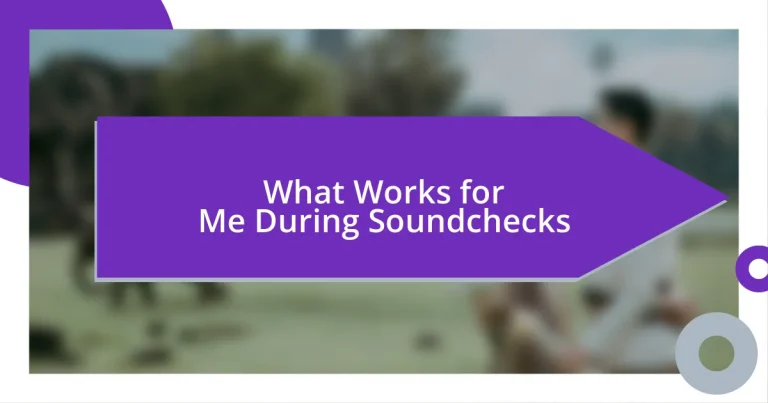Key takeaways:
- Soundchecks enhance performance quality and confidence by ensuring optimal sound levels, fostering collaboration between musicians and sound engineers.
- Effective preparation and clear communication before and during soundchecks are vital; establishing routines and providing specific feedback can significantly improve the overall sound experience.
- Adapting sound settings for different venues and circumstances, including gear checks and adjustments for environmental factors, is crucial to delivering a strong, responsive performance.
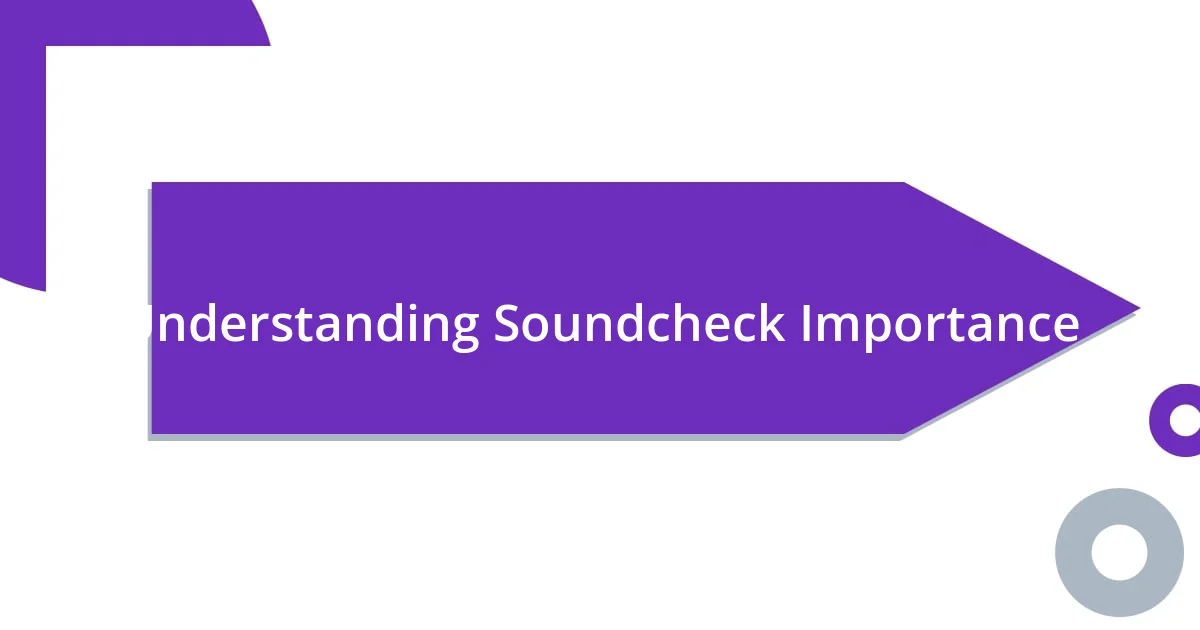
Understanding Soundcheck Importance
Soundchecks are the unsung heroes of live performances. I remember my first show where we skipped this vital step, thinking we could wing it. The moment we hit the stage, the sound was a chaotic mess, and it was a sinking feeling I never want to relive. Wouldn’t you agree that a few minutes spent tuning instruments and adjusting levels can save hours of stress later?
In my experience, soundchecks create a space for collaboration between musicians and the sound team. There’s something incredibly reassuring about hearing the rhythm of your guitar perfectly balance with the vocals. It’s more than just ensuring the mix is right; it’s about building confidence. Have you ever felt that surge of energy when everything clicks in the soundcheck? It’s that powerful moment that primes us for the performance ahead.
Moreover, soundchecks help manage the unpredictable nature of live shows. I once had a particularly rowdy venue where the sound fluctuated dramatically. Luckily, we had done a thorough soundcheck, allowing me to adjust quickly between sets. This preparation not only made me feel composed on stage but also allowed me to connect more deeply with the audience. Isn’t that the ultimate goal of any performance?
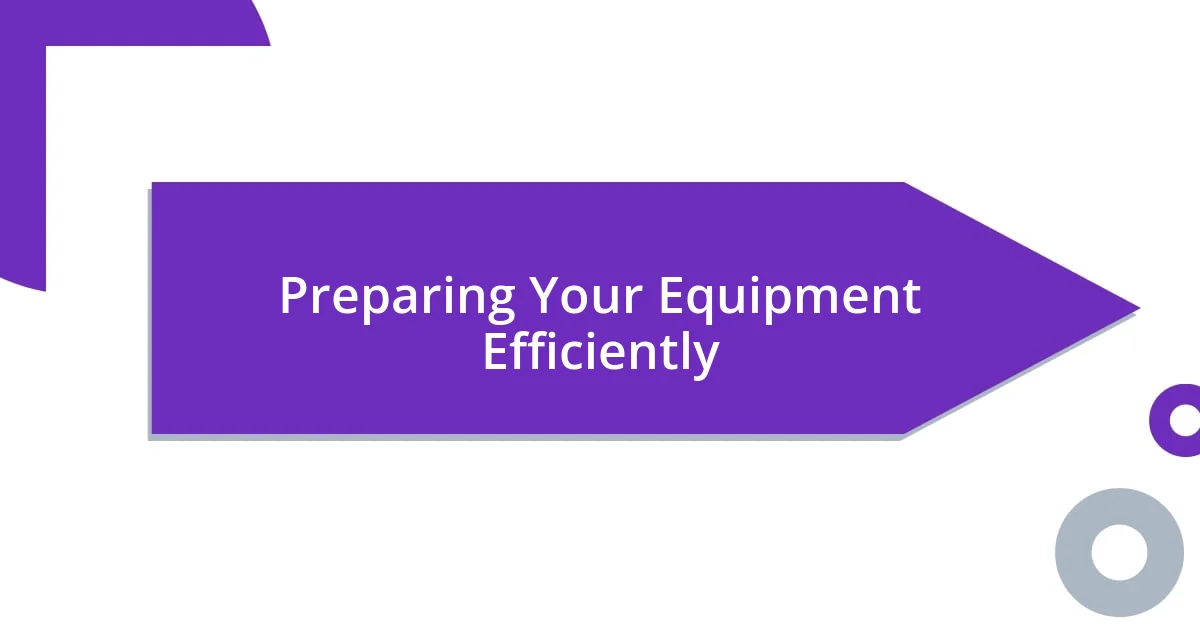
Preparing Your Equipment Efficiently
Preparing your equipment efficiently is about anticipating every detail before hitting the stage. I’ve found that organizing gear the night before can be a game changer. When I used to rush, I’d often forget crucial items like cables or spare strings. It’s that feeling of urgency that can create unnecessary anxiety right before a show. Now, I take the time to create a checklist, ensuring everything I need is ready and in one place.
Here are some tips I’ve found useful for efficient equipment preparation:
- Create a checklist: Include every item needed to avoid last-minute panic.
- Label your gear: This speeds up setup and reduces the chance of losing things.
- Pack thoughtfully: Arrange your equipment in the order of use to streamline the setup process.
- Inspect equipment: Look for any wear and tear to prevent surprises during the performance.
- Test connections: Ensure that cables and other connections are functioning properly before the soundcheck.
Having everything in its place not only enhances performance quality but also boosts my confidence. Each time I’ve meticulously prepared, I can focus on the music rather than worrying about gear. It’s a relief to walk on stage knowing I’m ready to shine.
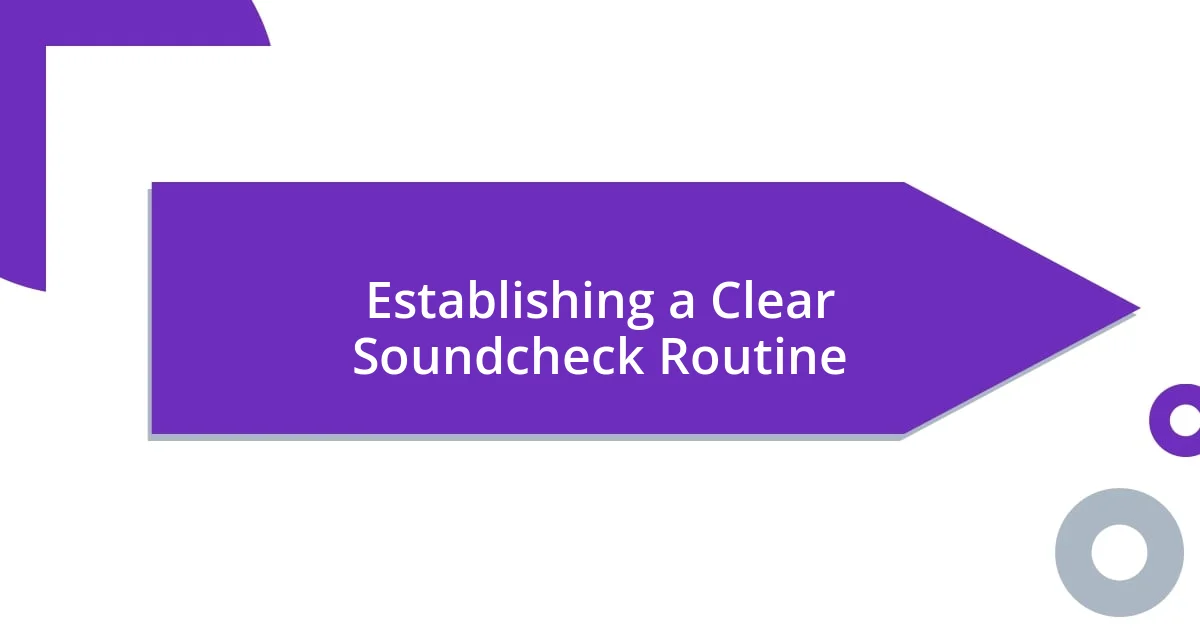
Establishing a Clear Soundcheck Routine
Establishing a clear soundcheck routine is crucial for maximizing efficiency and comfort on stage. When I first started performing, I’d approach soundchecks like a jigsaw puzzle—informal and chaotic. But I quickly realized how helpful a structured routine could be. Now, I follow a consistent sequence: I start with a quick mic check, followed by checking each instrument’s levels. This approach not only streamlines the process but also gives me a familiar rhythm to rely on during each performance.
There’s a profound sense of ease that comes from having a repeatable checklist. For example, before stepping on stage, I always ensure that my vocal levels are dialed in first. Because if I can hear myself clearly, I feel more in control of my delivery. In one memorable performance, my guitar unexpectedly lost volume halfway through the first set. Thanks to my routine, I noticed it immediately, adjusted it on the fly, and carried on without a hitch. This not only salvaged my performance but also kept the audience engaged—and that’s gold for a musician, isn’t it?
I also emphasize communication during soundchecks; it’s amazing how a bit of dialogue can make a world of difference. I remember one time where I got into a discussion with the sound engineer about the acoustics of the venue. By sharing my preferences and actively engaging with them, we were able to create a soundscape that elevated the entire show. It’s incredible how a clear routine allows for this kind of collaboration, ultimately making both the artist and the technical team feel more valued. This mutual respect can lead to not just better sound but a more profound connection with the audience.
| Routine Element | Personal Experience |
|---|---|
| Mic Check | Starting with vocals gives a solid foundation. I feel instantly more confident. |
| Instrument Levels | Adjusting my guitar sound mid-performance saved a show for me. |
| Communication | Talking to the sound engineer about preferences created a harmonious collaboration. |
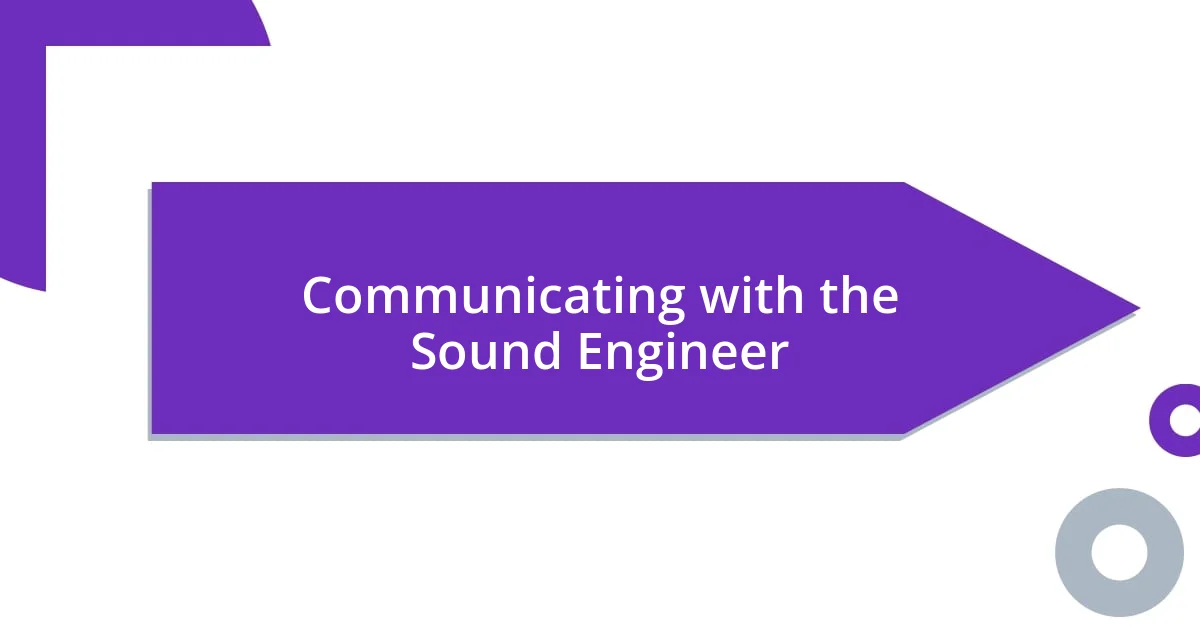
Communicating with the Sound Engineer
When it comes to communicating with the sound engineer, I believe clarity is key. In my earlier days, I often struggled to articulate what I wanted. I’d fumble over my words, and it was frustrating—both for me and the engineer. However, I learned that being specific about my needs boosts everyone’s confidence. For instance, instead of saying, “Can you make me sound better?” I now describe the sound I’m aiming for, like “I want a warmer tone on my vocals.” This little change has made a world of difference in how quickly we can get to the right mix.
One thing I’ve found really helpful is creating a dialogue throughout the soundcheck. I make a point to check in with the engineer frequently. A simple, “How does it sound on your end?” encourages valuable feedback. One night, while preparing for a gig at a venue known for its tricky acoustics, I noticed something was off. By candidly discussing it with the engineer, we discovered a slight resonance that I hadn’t caught. Their insights allowed us to make quick adjustments and ultimately improved my performance. Isn’t it surprising how a few words can shift the entire vibe on stage?
I also believe in the power of openness; sharing my emotional state with the sound engineer can transform our collaboration. If I’m feeling anxious, I’ll let them know. Interestingly, being transparent has led to mutual support. During one show, I confided my nerves about a particularly difficult song. The engineer responded with encouragement, ensuring my levels were perfect, which helped me relax and perform at my best. Hasn’t every artist had that moment where connection with their team made all the difference? I know I have, and it’s a reminder that soundchecks are not just technical necessities; they’re opportunities for genuine teamwork that enhance the overall experience for everyone involved.
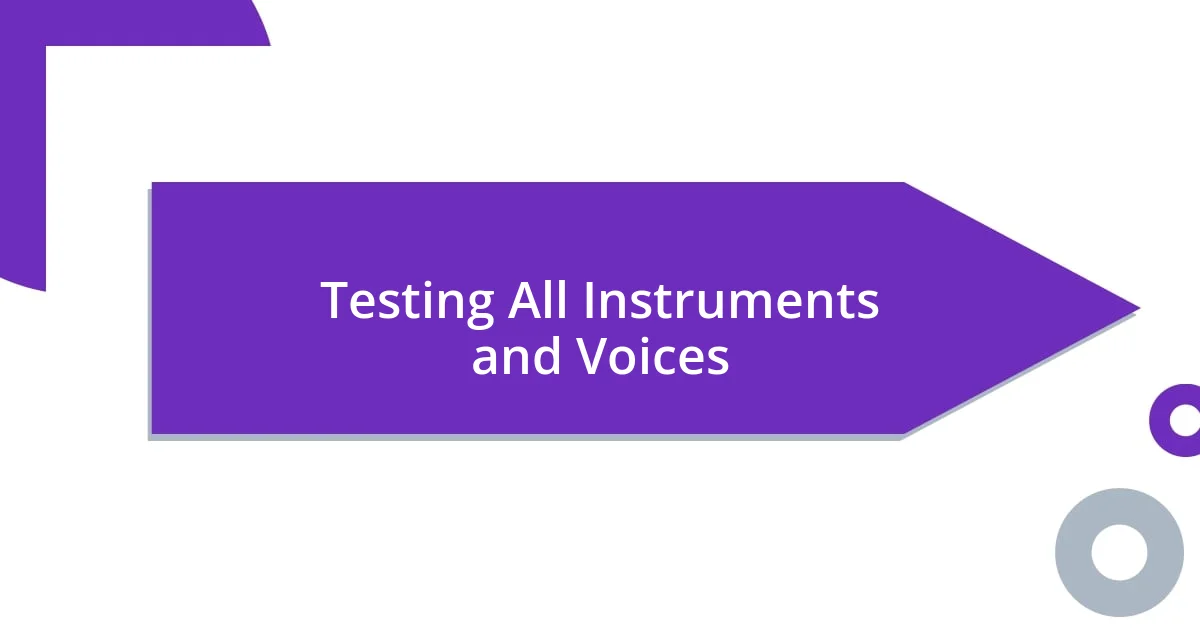
Testing All Instruments and Voices
Testing all instruments and voices is an essential part of the soundcheck process that can’t be overlooked. Whenever I step on stage, I start with my keyboard and go through each sound patch, ensuring every instrument is at the right level. I still remember a particularly intense moment at a festival when my keyboard unplugged mid-set. Thankfully, I had already tested it during soundcheck, so I quickly diagnosed the issue. It reinforced to me just how critical these checks really are.
I often make it a point to have the band join in for vocal tests. Have you ever tried to harmonize without hearing the backing vocals? It’s a challenge! I find that having everyone share their vocals helps align our sound, creating a rich blend that excites me. During one soundcheck, we discovered a perfect harmony on a song that we hadn’t quite nailed during rehearsals. That moment led us to perform the song more powerfully that night, and I could feel the audience connecting with us differently.
An unexpected benefit of thorough testing is the chance to experiment. For instance, I love trying out different mic placements to see how they interact with my guitar sound. One night, experimenting with a slightly off-axis mic setup resulted in a depth I hadn’t achieved before. I could feel the energy change—not just from my bandmates, but also from the audience. Isn’t it fascinating how little adjustments can lead to such a significant impact? Every soundcheck opens a window of possibilities, allowing us to discover new nuances in our music that might just turn an average performance into something memorable.
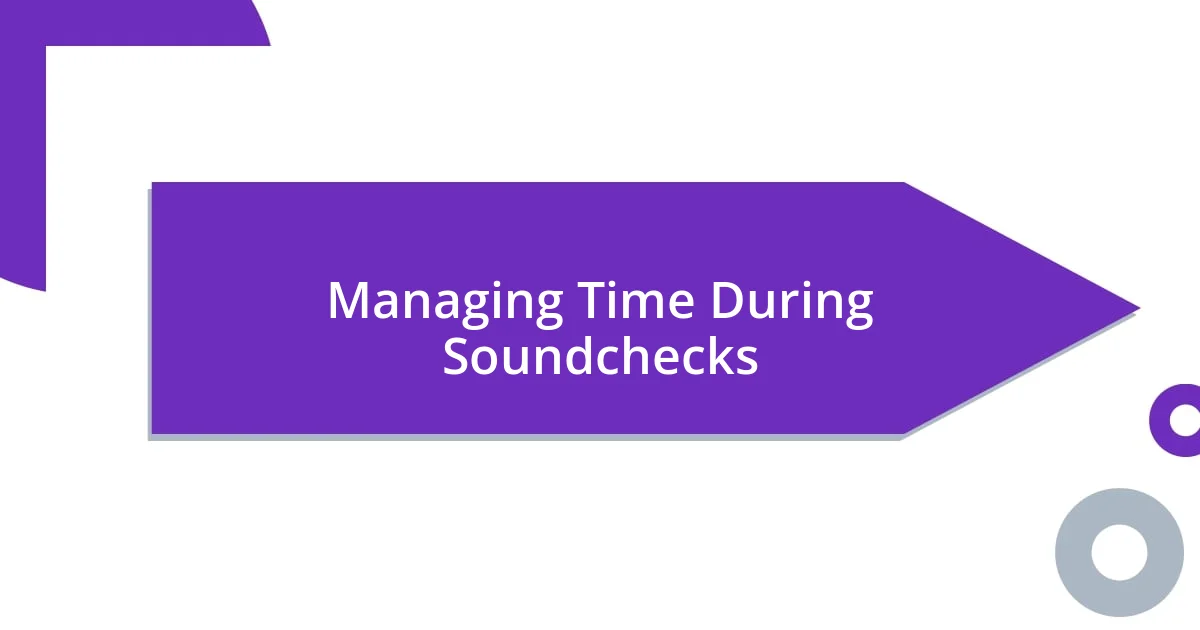
Managing Time During Soundchecks
Managing time during soundchecks can sometimes feel like a juggling act, but I’ve found that establishing a clear timeline helps tremendously. I like to segment the soundcheck into specific tasks, allocating a set amount of time for each element—vocals, instruments, and any special effects. This way, if something doesn’t sound right, I can make a quick decision whether to adjust or move on. There’s nothing worse than getting stuck on one issue and running out of time before the show starts.
I also keep a close eye on the clock, especially when I’m working with a larger band. A few times, I’ve had the misfortune of losing track of time and ending up rushed right before a performance. One evening, we were so caught up in perfecting the sound that we barely left ourselves enough time to run through our setlist. It was a valuable lesson; now, I use reminders to ensure we don’t lose sight of the big picture. Has this ever happened to you? It’s incredibly stressful, and being prepared can save you from that last-minute panic.
Lastly, incorporating a quick feedback loop at the end of the soundcheck is something I swear by. Just before wrapping up, I always ask the team for their thoughts on the overall sound and if there are any final tweaks we should address. I remember one night when a bandmate noticed a feedback issue I had overlooked. Addressing it together not only saved our set but also built our camaraderie and confidence on stage. So, what will you gain from a few minutes of reflection? I genuinely believe that investing those last moments can create an environment of collective ownership and awareness, benefiting everyone involved.
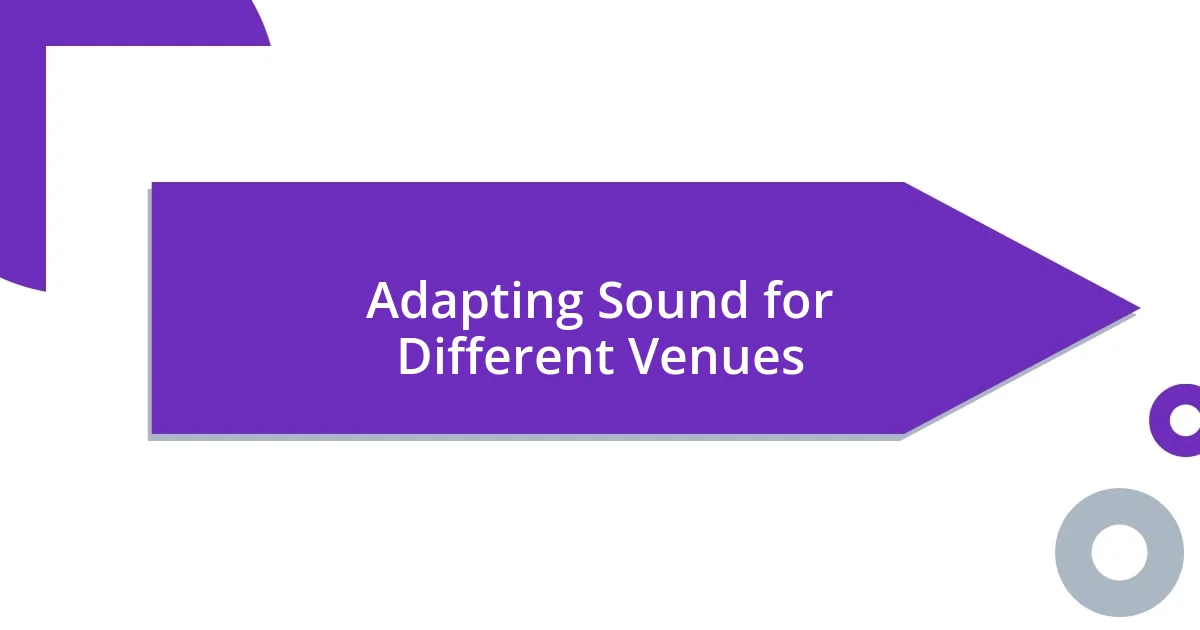
Adapting Sound for Different Venues
When it comes to adapting sound for different venues, I’ve discovered that each location brings its own unique characteristics. For example, the first time I played in an old theater, I was taken aback by the vibrant acoustics. The way my guitar seemed to resonate off the walls was mesmerizing, and it pushed me to adjust my settings to embrace that natural reverb. Have you ever experienced a space that transformed how you played? It really makes you rethink how you approach your sound!
Another time, I encountered a venue that had challenging electrical issues. The sound kept cutting out, and I had to be quick on my feet. It was stressful, but I learned to prioritize simpler setups that could still deliver quality sound even in less-than-ideal circumstances. This adaptability gave me a greater appreciation for the gear I have. How often do we think about having backup plans for our sound systems? I now carry a few extra cables and adapters just in case things go sideways.
Weather can also be a game-changer. After a gig outdoors where the wind was relentless, I learned to be mindful of how it affects vocal clarity as well. I remember adjusting my mic placement on the fly and using windshields to ensure my vocals carried well. It’s incredible how the environment can shape your performance—it reminds me every time that adaptability isn’t just about gear; it’s about being in tune with the space and circumstances. Have you faced similar challenges that made you rethink your approach? It’s all part of the journey, and each experience sharpens my understanding of sound in diverse settings.












